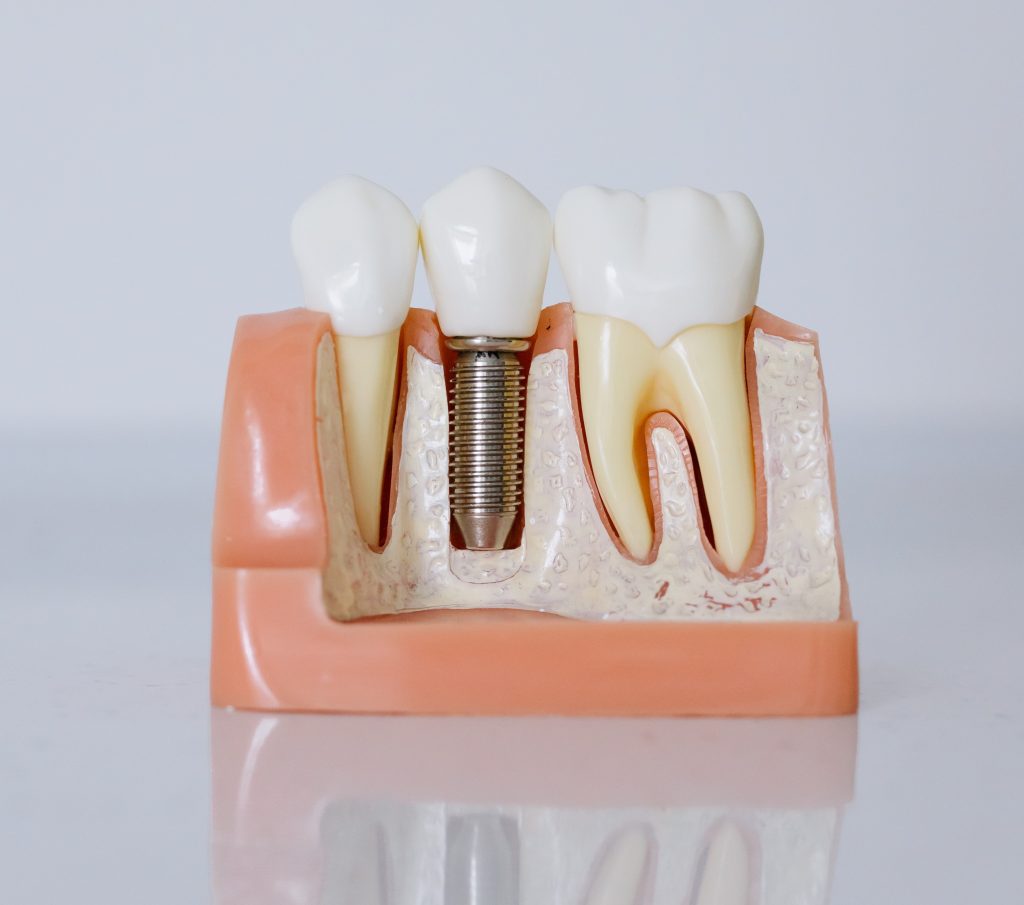Implant dentistry offers a treatment option to substitute missing teeth in the oral cavity, particularly the tooth roots. An implant consists of a shaft or post, mostly made up of titanium, which is inserted into the oral hard tissues (alveolar bone) to which an abutment (core) is attached. A crown then covers the core component of an implant to replace the function as well as the appearance of a natural tooth.
It serves as a pillar, thus providing a substructure that helps to support and retain the fixed (non-removable) or removable artificial teeth. Implant fixation into the jawbone involves a surgical process that takes months to reach the final stages. Just like any other dental prosthesis, it is extremely essential to maintain good oral hygiene for the implants. This helps to increase the life of an implant and lessens the chances of implant failure.
What does a dental implant do? (benefits)
- Helps to rehabilitate the eating process
- Improves your speech
- Enhances your appearance giving you a pleasant smile
- Helps to maintain good oral hygiene
- Long-lasting and resistant
- Helps to boost your self-confidence thus improving your quality of life
- More comfortable to patients as they don’t need to get removed.
- Prevents contraction of your jawbone
- Stabilize the adjacent teeth
What is the procedure?
An implant is placed into the bone in a couple of steps. They are:
- Inserting an implant post into the bone
- Wait for implant fusion with the surrounding bone (Osseointegration)
- Attach an abutment on the post
- Then place a crown on the abutment thus restoring tooth function.
Risks associated with dental implants
- Injury to the surrounding hard and soft tissues
- Loosening of an implant or tooth
- Poor oral hygiene
- Numbness due to nerve injury
- Opening of the line of incision
- Pain on biting
- Notify your health care provider about having a dental implant before any x-ray procedure.
What are the best implants for teeth?
There are two biocompatible implant materials that are presently offered in Australia:
- Titanium-based (metal)
- Zirconia (ceramic based)
Both of which are reliable and least prone to cause allergies. However, zirconia is a new revolution introduced to get rid of titanium metal allergies.
Who is best qualified to do dental implants?
An oral surgeon is the finest qualified person to perform dental implant procedures. This is because they can deal with highly complex surgical cases, medically compromised patients, and their complications.
Are dental implants painful?
- Local anesthesia is given before the procedure to ease the process.
- During the procedure, a little discomfort is felt by the patients
- Just after the procedure, mild pain is felt for about a week, which is normal. It should start to diminish after 3-5 days.
- After complete healing, the implant should be comfortable, and the patient should be happy with it.
Can you have two teeth on one implant?
Yes, it is possible to have two teeth on one implant. It highly depends on the infirmity of your gums.
This is done in cases of a fixed bridge (with more than one tooth) or to support a removable partial denture.
How long do dental implants last?
When proper care is taken, a dental implant is expected to last for a lifetime. However. The crown or bridge that is attached to an implant may need to be replaced after about 5 to 15 years.
How much time does the implant procedure take?
Mostly, the insertion of a dental implant into the bone takes one to two hours. Three to nine months after this procedure, a crown is placed over the implant post.
What is the success rate of an implant?
In general, dental implants have a very high success rate that is about 95-98%. Oral hygiene instructions should be followed carefully which is important for the lifelong success of an implant.
Does insurance cover the value of dental implants?
Health insurance here in Australia doesn’t cover dental implants. This is because implants are regarded solely as non-medical or beautifying. It covers minor dental procedures only.
How to take care after getting an implant?
- Use special brushes for cleaning the implant site as prescribed by your dentist
- Regular brushing and flossing prevent any infection around your implant
- Rinse with an antibacterial mouthwash
- Regular dental check-ups.
- Visit your dentist if implant becomes loose or painful.
If you have missing teeth that are affecting your confidence or ability to eat properly, contact us to schedule a visit to discuss the options available with dental implants.
